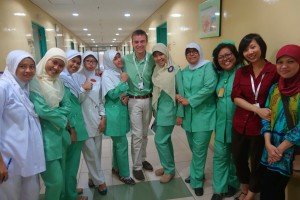Global health care challenges: Gaining first-hand perspective in far-away places
Every year, students in the Center for Bioengineering Innovation and Design (CBID) program are charged with designing medical devices to solve clinical problems in both Johns Hopkins Hospital and some of the world’s lowest resource areas. In order to do this effectively, they must understand the environs, resources, and needs of some of the world’s most deprived people.
Working in teams, CBID students spend two months in clinical rotations at Johns Hopkins Hospital before packing suitcases for monthlong trips to Europe, Southeast Asia, and sub-Saharan Africa.
Last summer, CBID Director Youseph Yazdi traveled with students to several locations in India, including a village on a mangrove island in the Sunderbans region—complete with crocodiles and an occasional Bengal tiger. In addition to making clinical observations, a team was testing Hemoglobe, a potentially lifesaving mobile device to screen for anemia, which was developed at CBID.
Excerpt from The Johns Hopkins Whiting School of Engineering Magazine. Read more



